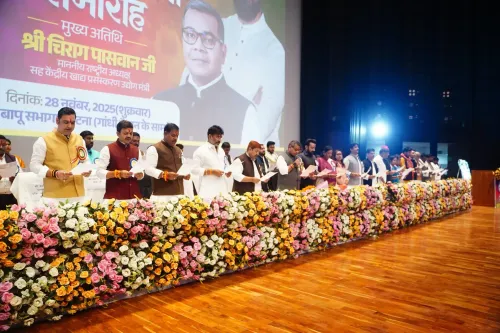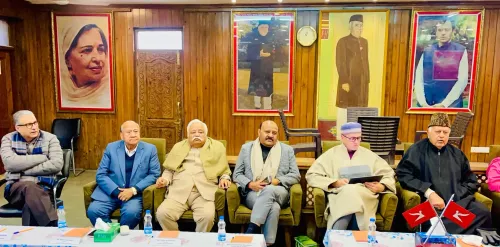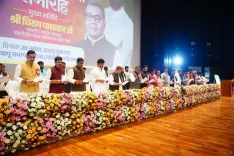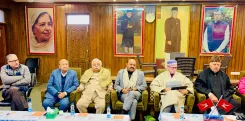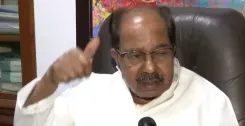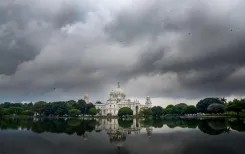Are the Centre's Policies Really Inspired by Lord Krishna's Teachings?
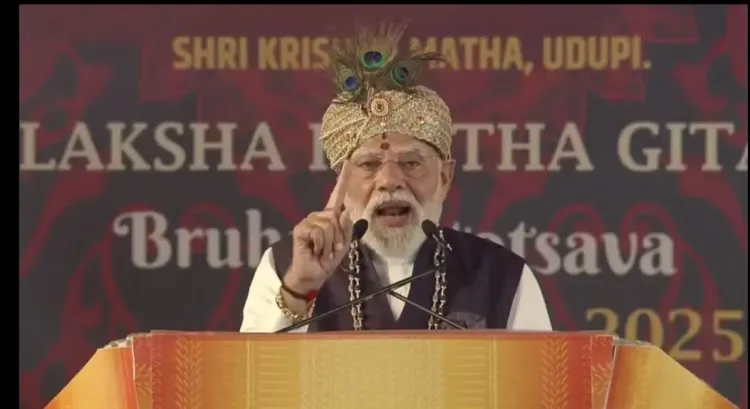
Synopsis
Key Takeaways
- Lord Krishna's teachings are integral to the Centre's policies.
- Mission Sudarshan Chakra aims to enhance national security.
- The government promotes women's empowerment through legislative measures.
- Udupi serves as an example of effective governance.
- Ancient wisdom continues to inform contemporary policy-making.
Udupi (Karnataka), Nov 28 (NationPress) Prime Minister Narendra Modi emphasized on Friday that the policies of the Centre draw inspiration from the teachings of Lord Krishna. He highlighted that India's national security strategy focuses on eradicating 'atyachaaris' (oppressors) to foster peace and uphold truth.
These comments were made during a significant gathering following his participation in the 'Laksha Kantha Gita' chanting at the Udupi Sri Krishna Math in Karnataka.
“Lord Krishna imparted his teachings amidst the chaos of battle. The essence of the Bhagavad Gita is that to achieve truth and peace, one must eliminate 'atyachaaris' (oppressors). This principle is foundational to our national security policy. We embrace the belief that the entire world is one family, guided by the principle of 'Dharmo Rakshati Rakshitah' (those who protect dharma will be protected),” he stated.
“From the Red Fort, we convey the message of Krishna's compassion. Inspired by this, we are launching Mission Sudarshan Chakra. This mission aims to create an unbreakable security barrier around critical national assets, industries, and public property. Any threat will be countered effectively by our Sudarshan Chakra,” PM Modi added.
He praised Operation Sindoor and contrasted his government's swift response to previous administrations. He asserted, “In the Pahalgam terror attack, numerous lives were lost, including those of our brothers and sisters from Karnataka. In the past, governments would remain inactive after such tragedies. However, we are witnessing a new India—one that stands firm and ensures the safety of its citizens. We know how to establish and maintain peace.”
PM Modi remarked that the teachings of the Bhagavad Gita serve as a guiding light not only for individuals but for the nation as a whole.
“The Gita emphasizes working for the welfare of society. Our policies, such as 'Sabka Saath, Sabka Vikas' and 'Sarvajan Hitaya, Sarvajan Sukhaya', are rooted in Krishna's teachings,” he explained.
He further noted, “Lord Krishna motivates us to uplift the underprivileged, reflected in initiatives like Ayushman Bharat and PM Awas Yojana. He also advocates for women's empowerment and education, which underpinned the enactment of the historic 'Nari Shakti Vandan Adhiniyam' (33% reservation for women in the Lok Sabha and state assemblies). His teachings also inform our philosophy that the world is one family,” he added.
PM Modi expressed that visiting Udupi is always a profound experience for him.
“Though I hail from Gujarat, there is a unique bond between Udupi and Gujarat. It is said that Mata Rukmini worshipped the idol of Sri Krishna in Gujarat, later installed here by Jagadguru Sri Madhvacharya,” he remarked.
“Recently, I visited the submerged city of Dwarka for blessings. Experiencing the darshan of this idol today has brought me immense spiritual joy,” he shared.
He also reflected on Udupi's legacy of effective governance.
“Udupi has long been a model for good governance, as seen with the Jan Sangh and the BJP. In 1968, the citizens chose the late V. S. Acharya of the Jan Sangh for the local corporation. Udupi has sown the seeds of good governance,” he stated.
“Decades ago, Udupi initiated the Swachhata Abhiyan, and a new drainage system was established here in the 1970s. Today, such initiatives are of national importance,” he noted.
“Just three days ago, I was in Kurukshetra, the land of the Gita. Today, receiving the blessings of Lord Krishna and visiting the land of Jagadguru Madhvacharya brings me immense happiness. When one lakh individuals chanted verses from the Bhagavad Gita together, the world witnessed the divine reflection of India's 1,000-year-old heritage,” PM Modi concluded.

